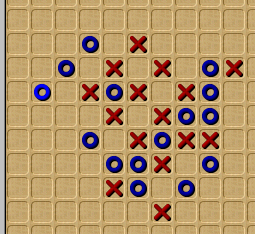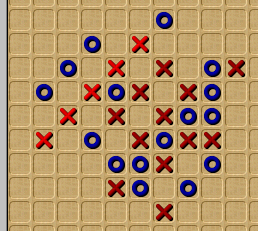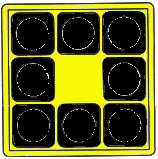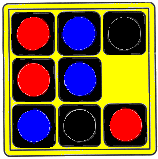
[Adrian] I'm not a mathematical person, but I like grid games (except draughts, funnily enough - because there is a form of looking ahead I seemed not to comprehend, though I am not sure about this). Reversi (Othello) I quite like, and this followed on Five in a Row.
In Five in a Row the object is to achieve that against one opponent trying to do the same. The board is big enough to be unrestrictive unless starting in a corner area (and then the second player has a clear field!) and only becomes restrictive if the game goes on some while.
In this game of Five in a Row (against the computer - try to scan a board where the pegs drop out!!) I am X, which goes first. There is a slight advantage in going first because you lead the way and make the strategy. Like in draughts, the idea is to build blocks (castles and flags in draughts, which have a middle and surrounding pegs, or four pegs and an extra). In fact if an unsurrounded castle is achieved in Five in a row, that person has won. The object is an "open four" because no matter where the opponent goes, the line of five is made.
As you play Five in a Row, and just like in Reversi's squares, but becoming, the holes acquire a certain defensive and attacking value. So you can block a development at one end, but is the other end better? You must develop holes which, even if later, join up with other potentially developing lines, so that fills can be made. At a point where a defence is not needed at one point, start an attack. A closed four may be useful in developing a block later on, though usually it is a dummy's strategy without this intention.
In this game my red position at a glance, to play next, looks fairly hopeless, but it transforms into a win.

The reason I must win is the open four now available. I had spent quite some time on defensive moves, but did move out to attack when it seemed I could risk not having a defensive move!


They can then move their own counters into any vacant tile, or move a tile or two with or without any player's counter/s on it/ them. The opponent cannot then push a tile back the next go to where it came from the previous go. The idea is to get three colours in a row. My maths is weak, but in a case of putting out all colours first (not required - tiles can be moved) this game is a forgone conclusion for the first player starting in one corner unless the second player goes opposite. Then it seems to be indeterminate.

So this is an example where blue has slid its tile into the middle and has won because red is without sufficient defence.
Hex was a game we made ourselves and played in the sixth form, but very definately the first person always won no matter how many hexagons are made. Bob Holness solved that one in asking questions first in Blockbuster. I always found September a very good game, of hexagonal strategy, which did seem to have no predestined outcome, but no one wanted to play me. This is where all these games fall down, when you seem to win more.
Well before her mental decline, I played my mother at Scrabble with a non-official wordbook; I learnt many of its two and three letter words and tried to make them into a grid. Now Facebook located online Scrabble has become of interest, playing against friends on the other side of the Humber.